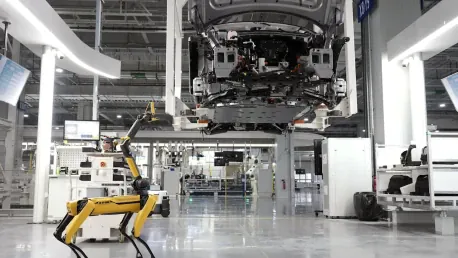The rapid evolution of artificial intelligence (AI) and automation technologies has brought remarkable advancements across multiple industries, and a groundbreaking new firm, T-Robotics, exemplifies this trend with its innovative approach. Headquartered in San Francisco and Trondheim, T-Robotics recently concluded a significant Seed funding round, raising $5.4 million from key investors such as Emergent Ventures and Engine Ventures, with additional support from Berkeley Skydeck and Raisewell. This substantial influx of capital is anticipated to spur growth and innovation, further cementing T-Robotics’ position at the forefront of AI and automation.
Under the expert guidance of Founder and CEO Asad Tirmizi and Co-founder and CTO Lars Tingelstad, T-Robotics is poised to revolutionize industrial automation with their pioneering software solution, ActGPT. Their mission aligns with enhancing productivity and operational efficiency across various business sectors, catalyzing a new era of intelligent robotics. By integrating advanced AI capabilities with user-friendly interfaces, T-Robotics aims to democratize access to cutting-edge robotic technology, making it available to a wide range of industries and organizations.
Key Features of ActGPT
ActGPT stands out in the realm of robotic programming primarily because of its user-friendly interface, which allows users to program robots using everyday language, thus nullifying the barriers that traditional programming often poses. Traditional robot programming requires complex coding skills which limit accessibility and ease of use, but ActGPT’s natural language programming approach revolutionizes this aspect. This innovation makes robotic technology accessible even to non-technical personnel, enabling more organizations to leverage the benefits of automation without needing specialized coding expertise.
The software’s robot-agnostic framework is another significant feature, designed to seamlessly integrate with a diverse range of robotic solutions, including robotic arms and mobile robots. This robot-agnostic approach ensures that ActGPT remains versatile and adaptable, catering to different industries’ needs for flexible automation solutions. By developing a framework that can work with various types of robots, T-Robotics creates a versatile tool that businesses across sectors can utilize to enhance their operations efficiently and effectively.
Moreover, ActGPT leverages advanced AI algorithms to process inputs from multiple data streams—visual, tactile, and linguistic. This robust multi-faceted approach fortifies the software, imbuing robots with the capacity to perform complex, nuanced tasks comparable to a skilled human worker. The ability to operate autonomously in unpredictable environments further enhances the software’s value, particularly in industries where operational conditions can change rapidly. This autonomous functionality is critical for ensuring that robots can safely and efficiently handle evolving tasks without constant human oversight, significantly boosting overall productivity and reliability.
Use Case Applications
T-Robotics’ AI-driven solutions have far-reaching implications across various sectors. In manufacturing, ActGPT can streamline complex assembly processes by enhancing precision and reducing errors, resulting in higher production efficiency. Moreover, it can perform meticulous quality inspections, ensuring that products meet stringent standards and reducing the likelihood of defects. This not only enhances productivity but also ensures higher standards of quality control, leading to improved customer satisfaction and reduced operational costs.
The logistics sector benefits significantly from ActGPT’s capabilities, with the software enhancing inventory management and optimizing order fulfillment processes. By automating labor-intensive tasks such as sorting, picking, and packing, businesses can achieve greater operational efficiency and accuracy. This automation ultimately leads to faster order processing times and minimal errors, which are critical for maintaining high customer satisfaction levels. As the e-commerce and logistics markets continue to grow, implementing such advanced automation solutions will become increasingly crucial for competitive differentiation.
The healthcare industry also stands to make substantial gains from ActGPT. One key area is robotic surgery, where ActGPT can facilitate precise, minimally invasive procedures, potentially improving patient outcomes and reducing recovery times. Automated systems can also assist healthcare professionals in patient care management, performing routine tasks and allowing them to focus more on direct patient care. This shift in focus can lead to better patient experiences and outcomes, as medical staff can allocate more time and resources to critical and complex cases rather than being bogged down by repetitive administrative duties.
Agriculture is another sector where ActGPT can have a profound impact. The software can bolster precision farming techniques, including automated planting, monitoring, and harvesting. These advancements promote sustainable farming practices by optimizing resource use and reducing waste. By employing robots that can work around the clock, farmers can increase productivity and adapt to changing environmental conditions swiftly. In an era where food security and sustainability are paramount concerns, ActGPT’s integration into agriculture can lead to better crop yields and more efficient farming practices.
Advantages and Potential Challenges
The considerable advantages of ActGPT are evident, with increased productivity being a primary benefit. Automating labor-intensive processes significantly reduces the need for manual labor while boosting production rates. This is particularly valuable in industries where speed and efficiency are critical to maintaining competitiveness. The consistent performance provided by robots ensures that operations maintain a high level of reliability and quality, contributing to overall organizational success.
The user-friendly nature of ActGPT is another major advantage, as it utilizes natural language programming, eliminating the necessity for technical expertise. This democratizes access to robotic technology, making it accessible to a broader range of users within an organization. Non-technical personnel can easily learn to operate robots, facilitating smoother integration of automation solutions into daily operations. By lowering the barriers to entry, ActGPT enables more businesses to benefit from advanced automation, leading to widespread adoption and significant productivity gains across various industries.
However, potential challenges must be considered. One concern is the dependency on technology, as over-reliance on autonomous systems could raise issues, particularly in critical sectors historically dependent on human oversight. While robots can handle repetitive tasks efficiently, human intuition and decision-making are still vital in managing complex and unforeseen situations. Finding a balance between human and robotic operations will be crucial to ensure both efficiency and reliability. Businesses must establish protocols to integrate human oversight into automated processes to mitigate risks and maintain operational integrity.
Integration challenges are another potential hurdle. Even though ActGPT is designed for compatibility, integrating the software with existing systems might initially require additional resources and time. Organizations may need to invest in training and support to ensure a smooth transition, which can be a costly and time-consuming process. Additionally, managing the change within the workforce and addressing the potential resistance to adopting new technologies are critical aspects that businesses need to handle carefully. Overcoming these challenges will be essential to fully leverage the advantages that ActGPT offers and achieve long-term success in implementing automation.
Innovation and Security Aspects
The development and deployment of ActGPT exemplify significant innovation within the robotics industry. As robots become increasingly integrated into essential operations, T-Robotics acknowledges the critical importance of security. Cybersecurity threats and data integrity are paramount concerns in this context. Ensuring the protection of sensitive data and maintaining operational security is crucial as automation systems handle more substantial portions of business processes. T-Robotics aims to address these security challenges proactively.
T-Robotics intends to set a high priority on implementing potent security measures to mitigate potential vulnerabilities and safeguard against cyber threats. This includes robust encryption protocols to protect data transmissions, regular security audits to identify and address any weaknesses, and continuous monitoring to detect and respond to potential breaches proactively. By incorporating these security measures, T-Robotics aims to build trust with its clients, ensuring the safe and reliable operation of its robotic solutions. This commitment to security is critical as the company continues to grow and expand its technology into various industries, maintaining a strong reputation and client trust.
By prioritizing security effectively, T-Robotics not only enhances the reliability of its solutions but also fosters a sense of confidence among its clients. Businesses can adopt ActGPT with the assurance that their data and operations remain protected against potential cyber threats. This proactive stance on security will be essential as the company further integrates its technology into more critical and sensitive areas of industry. As automation becomes more ubiquitous, robust security measures will play a vital role in protecting data integrity and maintaining continuous, secure operations.
Market Trends and Future Outlook
The rapid development of artificial intelligence (AI) and automation technologies has resulted in significant advancements in various industries. A new firm, T-Robotics, is leading this trend with its innovative approach. Based in San Francisco and Trondheim, T-Robotics recently completed a major Seed funding round, securing $5.4 million from prominent investors like Emergent Ventures and Engine Ventures, with additional backing from Berkeley Skydeck and Raisewell. This substantial investment is expected to drive growth and innovation, strengthening T-Robotics’ position at the forefront of AI and automation.
Guided by Founder and CEO Asad Tirmizi and Co-founder and CTO Lars Tingelstad, T-Robotics is set to transform industrial automation with their groundbreaking software, ActGPT. Their mission focuses on boosting productivity and operational efficiency across various sectors, heralding a new era of intelligent robotics. Combining advanced AI capabilities with user-friendly interfaces, T-Robotics intends to democratize access to state-of-the-art robotic technology, making it accessible to a wide array of industries and organizations.









